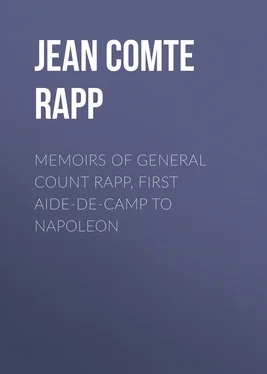Jean Comte Rapp - Memoirs of General Count Rapp, First aide-de-camp to Napoleon
Здесь есть возможность читать онлайн «Jean Comte Rapp - Memoirs of General Count Rapp, First aide-de-camp to Napoleon» — ознакомительный отрывок электронной книги совершенно бесплатно, а после прочтения отрывка купить полную версию. В некоторых случаях можно слушать аудио, скачать через торрент в формате fb2 и присутствует краткое содержание. Жанр: Биографии и Мемуары, История, foreign_edu, foreign_antique, foreign_prose, на английском языке. Описание произведения, (предисловие) а так же отзывы посетителей доступны на портале библиотеки ЛибКат.
- Название:Memoirs of General Count Rapp, First aide-de-camp to Napoleon
- Автор:
- Жанр:
- Год:неизвестен
- ISBN:нет данных
- Рейтинг книги:5 / 5. Голосов: 1
-
Избранное:Добавить в избранное
- Отзывы:
-
Ваша оценка:
- 100
- 1
- 2
- 3
- 4
- 5
Memoirs of General Count Rapp, First aide-de-camp to Napoleon: краткое содержание, описание и аннотация
Предлагаем к чтению аннотацию, описание, краткое содержание или предисловие (зависит от того, что написал сам автор книги «Memoirs of General Count Rapp, First aide-de-camp to Napoleon»). Если вы не нашли необходимую информацию о книге — напишите в комментариях, мы постараемся отыскать её.
Memoirs of General Count Rapp, First aide-de-camp to Napoleon — читать онлайн ознакомительный отрывок
Ниже представлен текст книги, разбитый по страницам. Система сохранения места последней прочитанной страницы, позволяет с удобством читать онлайн бесплатно книгу «Memoirs of General Count Rapp, First aide-de-camp to Napoleon», без необходимости каждый раз заново искать на чём Вы остановились. Поставьте закладку, и сможете в любой момент перейти на страницу, на которой закончили чтение.
Интервал:
Закладка:
The Emperor fixed his head-quarters at Charlottemburgh. On the following day, he made his entrance into the capital, and addressed the following proclamation to the army:—
"Soldiers!
"You have fulfilled my expectations, and fully justified the confidence of the French people. You have endured privation and fatigue with courage, equal to the intrepidity and presence of mind which you evinced on the field of battle. You are the worthy defenders of the honour of my crown, and the glory of the great French people. So long as you continue to be animated by the spirit which you now display, nothing can oppose you. I know not how to distinguish any particular corps.... You have all proved yourselves good soldiers. The following is the result of our exertions in this campaign.
"One of the first powers in Europe, which lately proposed to us a dishonourable capitulation, has been overthrown. The forests and defiles of Franconia, the Saale, and the Elbe, which our fathers would not have crossed in seven years, we have traversed in seven days; and in that short interval we have had four engagements, and one great battle. Our entrance into Potsdam and Berlin has preceded the fame of our victories. We have made 60,000 prisoners, taken sixty-five standards, (among which are the colours of the King of Prussia's guards), six hundred pieces of cannon, and three fortresses. Among the prisoners, there are upwards of twenty generals. But notwithstanding all this, more than half our troops regret not having fired a single musket. All the provinces of the Prussian monarchy, as far as the Oder, are in our power.
"Soldiers! the Russians boast of coming to meet us, but we will advance to meet them; we will save them half their march: they will meet with another Austerlitz in the midst of Prussia. A nation which can so soon forget our generous treatment of her, after that battle, in which the Emperor, his court, and the wrecks of his army, owed their safety only to the capitulation we granted them, is a nation that cannot successfully contend with us.
"While we march to meet the Russians, new corps, formed in the interior of our empire, will repair hither, to occupy our present stations, and protect our conquests. My people all rose indignantly on hearing the disgraceful capitulation which the Prussian ministers, in their madness, proposed to us. Our frontier roads and towns are filled with conscripts, who are burning with eagerness to march in your footsteps. We will not again be the dupes of a treacherous peace. We will not lay down our arms until we compel the English, those eternal enemies of France, to renounce their plan of disturbing the Continent, and to relinquish the tyranny which they maintain on the seas.
"Soldiers! I cannot better express the sentiments I entertain for you, than by assuring you that I bear in my heart the love which you daily evince for me."
CHAPTER XIV
Napoleon next proceeded to the camp, and reviewed the third corps; and every individual who had particularly distinguished himself was rewarded, either by promotion or by a decoration. The generals, officers, and subalterns, were assembled round the Emperor. "I wished to call you together," said he "in order to express my satisfaction of your brilliant conduct in the battle of the 14th. I lost many brave men, whom I looked upon as my sons; I deeply regret them; but, after all, they fell on the field of glory—they perished like true soldiers! You have rendered me a signal service on this memorable occasion. We are, in particular, indebted to the excellent conduct of the third corps, for the great results we have obtained. Tell your men that I am satisfied with the courage they have displayed. Generals, officers, subaltern officers, and privates, you possess eternal claims on my gratitude and kindness." The Marshal replied, that the third corps would always prove itself worthy of the Emperor's confidence; that it would constantly be to him what the 10th legion was to Cæsar.
M. Denon was present at this interesting scene, which his pencil will, perhaps, commemorate: but, whatever be the talent of the artist, he can never convey an idea of the satisfaction and kindness which beamed in the features of the sovereign; or the devotedness and gratitude expressed in the countenances of all present, from the Marshal down to the meanest soldier.
The proclamation which Napoleon had addressed to the troops inspired them with new ardour. They rushed forward to pursue the wrecks of the forces, which had been engaged at Halle and Jena. The Prince of Hohenlohe had rallied a considerable mass, with which he might have escaped us; but he was not sufficiently speedy, he lost time, and these delays afforded us the hope of seeing him cut off. Napoleon impatiently looked for this event. "Bernadotte," said he to me, as we were entering the palace, "must by this time be at Bremen. He will surely have come up with the Prussians; Murat will attack them with his usual impetuosity; both together must have a greater force than is necessary to beat them. In a few days hence the Prince of Hohenlohe, with all his corps, will be in my hands; and I shall soon after have all their artillery and baggage. But we must act together; for it is not probable that they will suffer themselves to be taken without coming to an engagement."
Every thing happened as Napoleon had foretold. The Prussians, who were thrown into disorder by the attack of our cavalry, and the showers of grape shot, were summoned to surrender by General Belliard, and they laid down their arms. Twenty-five thousand picked troops, forty-five standards, seventy-four pieces of artillery, defiled before us: it was another conquest of Ulm. The Emperor was transported with his success: "This is well," said he; "but we have not yet got Blucher, who is so clever at making extempore armistices. We must have him also." He immediately addressed the following lines to Murat: "Nothing is done, so long as any thing remains undone. You have turned General Blucher's cavalry; let me soon hear that his force has experienced the fate of Hohenlohe's." Berthier also wrote to him as follows, to call his attention to the Duke of Weimar: "Independently of the little detached columns, there are three principal ones: 1st. That commanded by Prince Hohenlohe, which you have taken at Prentzlow; 2d. Blucher's column, which at daybreak on the 28th quitted Wissemberg, and which you must certainly have fallen in with to-day at Passelwalch; and 3d. The Duke of Weimar's column, which escaped Marshal Soult, and effected the passage of the Elbe, as it would appear, near Saudon and Havelsberg, on the 26th, whence it proceeded in the direction of Wursterhausen, Newrupin, Grausee, or Furstemberg. From Havelsberg to Furstemberg is a distance of twenty-five leagues; consequently the Duke of Weimar cannot reach Furstemberg on the 28th. But from Furstemberg to Passelwalch is only twenty leagues distance; and if the enemy's column should take that route, you will certainly fall in with it at Passelwalch on the 30th or 31st. Thus it may be presumed that nothing can escape between you and Marshals Lannes and Bernadotte. Such is the information which I am enabled to communicate to you from the accounts that have reached the Emperor."
But the Duke was tired of sharing the disasters of the Prussian army. He negotiated and transferred the command of his troops to Blucher, who, intent on his retreat, fled without caring or even knowing where he went. His route disconcerted Napoleon. "What does he intend?" said he; "whither is he going? I cannot imagine that he will throw himself into Holstein; for when once there, he will find no means of retreat. He cannot recross the Elbe; he will be driven up, and his troops will be drowned. He will never think of making such an attempt. We shall soon have him here." Blucher laid down arms some days after. He had passed through the whole of Prussia, and had violated the Danish territory, with no other object than to defer for a few days the surrender of between 20 and 25,000 men, the standards, and last artillery of the Prussians. With a little more skill, Blucher might have turned his obstinacy to better account. "Well," said Napoleon, on learning this news, "they are now advancing with the Austrians. They will be more reserved in future; they will say nothing more about Ulm. In three weeks they have four times renewed it. Blucher must be sent to France, to Dijon; there he may amuse himself in forging armistices. Write to General Belliard." The following despatch was sent off:
Читать дальшеИнтервал:
Закладка:
Похожие книги на «Memoirs of General Count Rapp, First aide-de-camp to Napoleon»
Представляем Вашему вниманию похожие книги на «Memoirs of General Count Rapp, First aide-de-camp to Napoleon» списком для выбора. Мы отобрали схожую по названию и смыслу литературу в надежде предоставить читателям больше вариантов отыскать новые, интересные, ещё непрочитанные произведения.
Обсуждение, отзывы о книге «Memoirs of General Count Rapp, First aide-de-camp to Napoleon» и просто собственные мнения читателей. Оставьте ваши комментарии, напишите, что Вы думаете о произведении, его смысле или главных героях. Укажите что конкретно понравилось, а что нет, и почему Вы так считаете.












